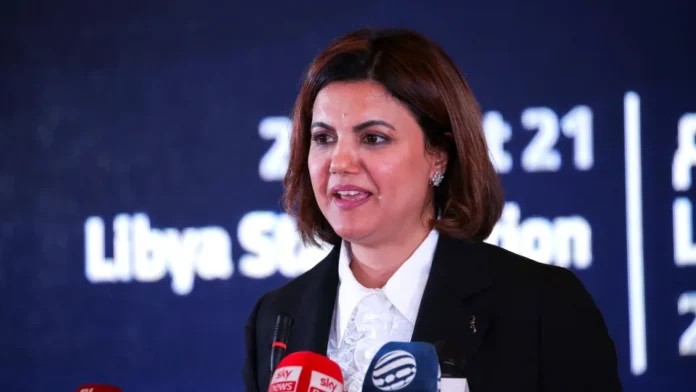Libya dismisses foreign minister after meeting with Israeli counterpart
In a turn of events that caught many off guard, the internationally recognized government of Libya has become the center of attention due to the significant rendezvous between Foreign Minister Najla Mangoush and her Israeli counterpart, Foreign Minister Eli Cohen, in the heart of Rome. This unexpected meeting has ignited widespread conversations and conjectures, echoing far beyond the confines of the conference chamber. The dynamics of this diplomatic assembly have captured the global gaze, raising inquiries about its far-reaching implications, the formal stance of the respective nations, and the potential for forthcoming collaborations.
Illuminating the Diplomatic Convergence
Amidst the intricate interplay that envelops international relations, Israel’s foreign ministry issued a declaration on a Sunday evening, confirming the occurrence of the summit. While the Libyan foreign ministry hastily dismissed the encounter as “casual,” “unplanned,” and devoid of “deliberations or consultations,” the weight of this convergence cannot be downplayed. The Libyan foreign ministry also underscored that Minister Mangoush employed this occasion to reaffirm Libya’s steadfast dedication to the Palestinian cause.
Clash of Narratives
An insider’s view into the behind-the-scenes dialogues exposes contrasting depictions between the entities involved. An Israeli insider, who chose anonymity due to the sensitive nature of diplomatic matters, contradicted the Libyan version. This source asserted that the meeting between the two foreign ministers had indeed been strategically arranged, with the aim of revealing it at an opportune moment. Though both parties acknowledge the meeting, the disparity in portrayal underscores the intricacies that underscore diplomatic exchanges.
Untold Chronology
As diplomatic intricacies continue to unfold, the question of timing takes center stage in the saga. Reports suggest that discussions regarding the disclosure of the meeting’s occurrence transpired prior to the ministers’ rendezvous. Nonetheless, consensus on when to publicly unveil this information had not been reached, unveiling the meticulous contemplations and strategic deliberations that mold international diplomacy.
Israel’s Swift Reply
The swift response from Israel’s foreign ministry to inquiries about the meeting adds another layer to the narrative. In response to an Israeli journalist’s inquiry, the ministry promptly issued an official statement detailing the event. This swift acknowledgement further underscores the importance of the encounter, leaving experts and observers alike to decode the broader intentions behind this proactive communication.
The Shadow of Libya-Israel Relations
Diplomatic connections between Libya and Israel remain a contentious and delicate subject. The normalization of relations between these two nations has been a topic of debate and conjecture, often provoking polarized reactions from within Libya and the larger international community. Social media platforms have transformed into arenas for voicing opinions, with videos depicting Libyan demonstrators burning Israeli flags and attempting to breach government premises, reflecting the intense emotions surrounding this issue.
Israel’s Forward-Looking Outlook
Foreign Minister Eli Cohen’s portrayal of the summit as “historic” underscores Israel’s sanguine outlook towards the future. Cohen accentuates that this meeting marks the initial stride towards cultivating meaningful bonds between Israel and Libya. The foreign minister also alludes to the vast potential inherent in bilateral relations, touching upon the significance of safeguarding the heritage of Libyan Jewry. Cohen’s mention of refurbishing synagogues and Jewish graveyards within Libya accentuates the nuanced aspects of the evolving discourse.
Libya’s Perpetual Struggles
To grasp the importance of this diplomatic endeavor, one must contextualize it within Libya’s tumultuous trajectory since the overthrow of former ruler Moammar Gadhafi in 2011. The void left in the aftermath of the NATO-supported uprising has resulted in a fractured nation, with two competing governments striving for dominance from their respective bases in Tripoli and Benghazi. This internal partition has compounded Libya’s hardships, rendering any foreign interaction a sensitive issue intertwined with domestic intricacies.
A Novel Chapter Unveiled
In summation, the rendezvous between Libya’s Foreign Minister Najla Mangoush and Israel’s Foreign Minister Eli Cohen carries profound ramifications for both nations and the broader global landscape. The contradictory accounts, divergent perspectives, and historical context enrich the discourse enveloping this meeting. As the world observes this diplomatic progression unfold, it serves as a reminder of the elaborate dynamics that mold international relations.







